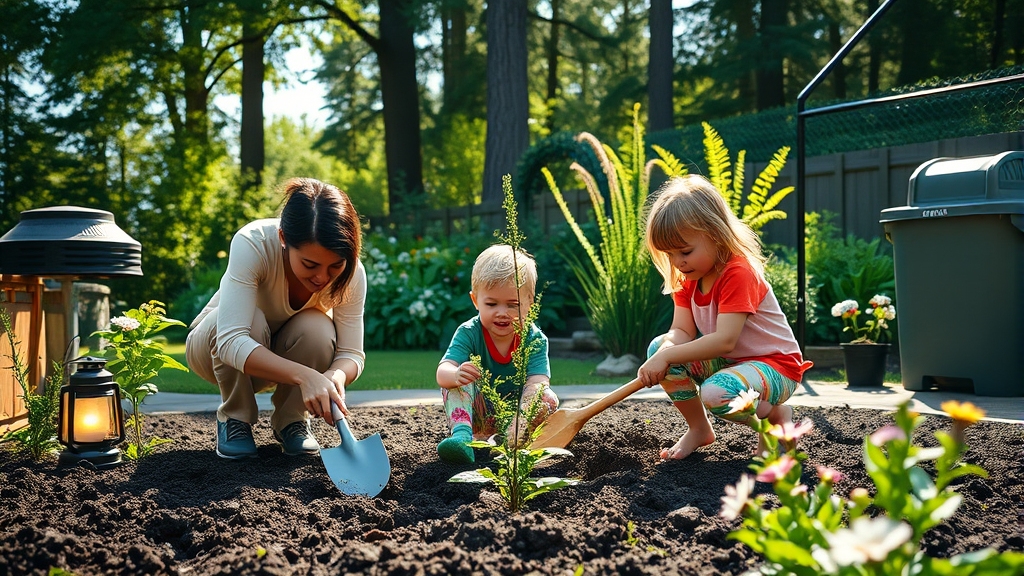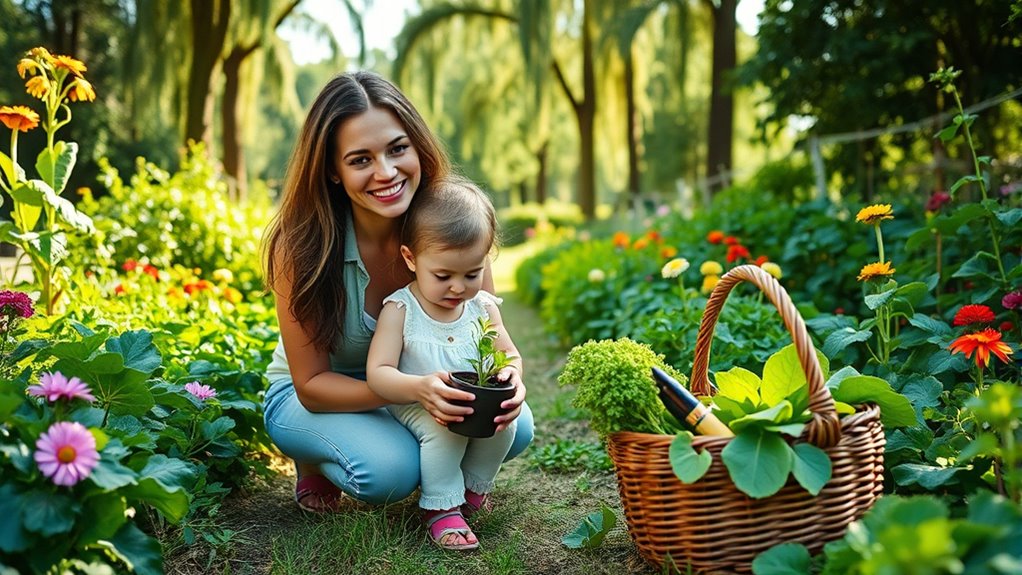To raise eco-conscious kids, focus on setting eco-friendly habits and choosing sustainable toys made from natural materials. Teach them the value of waste reduction through reusable routines and involving them in zero waste practices. Encourage skills like bike maintenance to promote sustainable transportation. Your daily choices, like using eco-aware products, help shape their understanding of environmental responsibility. Keep exploring ways to nurture their stewardship, and you’ll find plenty of ideas to make a lasting impact.
Key Takeaways
- Incorporate eco-friendly toys made from natural, sustainable materials to teach children about sustainability through play.
- Model and practice reusable habits like cloth napkins and snack bags to instill waste reduction awareness.
- Educate children on natural materials and practical skills, such as bike maintenance, to promote sustainable lifestyles.
- Engage kids in zero waste routines to foster environmental stewardship and mindful consumption habits.
- Emphasize early lessons on eco-conscious choices to shape lifelong environmentally responsible behaviors.

Have you ever wondered how your parenting choices can impact the planet? It’s a powerful realization that the way you raise your kids can shape their understanding of sustainability and their future actions. One simple but significant step is selecting eco friendly toys. Instead of opting for plastic, mass-produced items that quickly break or end up in landfills, choose toys made from natural, sustainable materials like wood, organic cotton, or bamboo. These toys are not only better for the environment but also safer for your children, free from harmful chemicals often found in conventional plastics. When you prioritize eco friendly toys, you teach your kids early on about the value of sustainability and the importance of making mindful choices. It’s a fun way to introduce them to eco-conscious living, fostering a sense of responsibility that can last a lifetime. Incorporating natural materials into their play encourages a closer connection to the environment and sparks their curiosity about the world around them. Additionally, understanding bike maintenance, such as how to change gears or inflate tires properly, can be a practical skill that promotes sustainable transportation habits as they grow older. Teaching children reusable habits not only reduces waste but also instills discipline and awareness about environmental impacts. Involving your children in zero waste routines also helps them see waste not as inevitable but as something they can actively reduce. This mindset encourages them to question disposable habits and develop habits that benefit the environment. It’s about instilling a sense of stewardship, showing them that small changes—like using cloth napkins or carrying reusable snack bags—add up over time.
Frequently Asked Questions
How Can I Teach My Toddler About Recycling Effectively?
To teach your toddler about recycling effectively, start with simple sorting activities using household items. Make it fun by creating recycling crafts together, which helps them understand different materials. Use clear labels and demonstrate how to separate items like paper, plastic, and metal. Keep lessons short and engaging, praising their efforts. Repetition and positive reinforcement will help your toddler grasp the concept and develop eco-friendly habits early on.
Are Eco-Friendly Toys Safe for My Baby’s Health?
Thinking about eco-friendly toys? You’ll want to prioritize safety by checking for toxins and chemical concerns. Look for labels that guarantee toys are free from toxic materials, phthalates, and BPA. Trust brands committed to transparency, and avoid anything with questionable dyes or finishes. Ultimately, safe, sustainable toys support your baby’s health while helping the planet, so always scrutinize ingredients and manufacturing practices before making your choice.
How Do I Manage Screen Time While Promoting Outdoor Play?
Managing screen time while encouraging outdoor play involves creating a digital balance that prioritizes active, outdoor activities. You can set specific limits on device use, making room for outdoor adventures that foster connection with nature. By establishing a routine that includes plenty of outdoor play, you help your kids develop healthy habits. Keep screens as a reward or break, ensuring they enjoy the benefits of both digital engagement and outdoor exploration.
What Are Budget-Friendly Ways to Reduce Household Waste?
To cut household waste on a budget, start composting food scraps and yard waste; it’s free and reduces landfill. Get creative with upcycling crafts—repurpose jars, old clothes, or furniture instead of buying new. These simple composting tips help you recycle naturally, while upcycling crafts add a personal touch to home decor. You’ll save money, lessen waste, and teach your family eco-friendly habits that last.
How Can I Involve Remote or Busy Parents in Sustainable Practices?
You can involve remote or busy parents in sustainable practices by encouraging virtual involvement, like participating in online eco-challenges or webinars. Suggest flexible routines, such as quick eco-friendly tips they can incorporate into their busy schedules. Share simple, actionable tasks that fit into their day, making sustainability accessible regardless of time constraints. This way, they stay engaged and contribute to eco-conscious efforts without feeling overwhelmed or disconnected.
Conclusion
So, go ahead, teach your kids to recycle, grow their own veggies, and skip plastic toys. Who knows? Maybe someday they’ll save the planet—one questionable school project, one questionable fashion choice, and one questionable snack at a time. After all, who needs superheroes when your little eco-warrior is busy saving the Earth, one reusable straw at a time? Just remember, if all else fails, at least you’ll have some great stories to tell at dinner parties.






